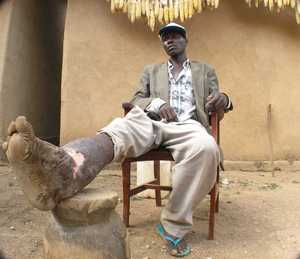The Burden of Lymphatic Filariasis (LF)

Joseph Gondovo, a patient receiving treatment for LF. Credit: The Carter Center/Emily Staub, Jos, Nigeria 2004.
LF is an infection caused by microscopic worms, transmitted to humans by the bite of an infected mosquito. LF infection can lead to permanent disability from swollen limbs and breasts (lymphedema), damage to the genitals (hydrocele) or swollen limbs with thickened, hardened skin (elephantiasis). Over a billion people are at risk in 73 countries; over 120 million individuals are already infected with LF. Those with severe symptoms of the disease are often unable to work and may suffer significant social stigma as a result of their disfigurement. Many are ostracized or even shunned by those in their communities.
In areas where LF is common, treatment of individuals with anti-parasitic drugs (albendazole donated by GlaxoSmithKline plus either MectizanTM donated by Merck & Co., Inc. or low-cost diethylcarbamazine (DEC) donated by Eisai) annually for at least five years can break the cycle of transmission.
More on: Lymphatic Filariasis
- Page last reviewed: June 14, 2013
- Page last updated: June 14, 2013
- Content source:


 ShareCompartir
ShareCompartir